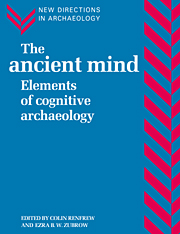Book contents
- Frontmatter
- Contents
- List of figures
- List of tables
- List of contributors
- Preface
- PART I INTRODUCTION
- 1 Towards a cognitive archaeology
- PART II THE INTERDISCIPLINARY UNDERPINNING
- PART III APPROACHES TO CULT PRACTICE AND TRANSCENDENTAL BELIEF SYSTEMS
- PART IV PREHISTORIC CONCEPTIONS OF SPACE AND TIME
- PART V THE MATERIAL BASIS OF COGNITIVE INFERENCE: TECHNOLOGY
- PART VI THE MATERIAL BASIS OF COGNITIVE INFERENCE: WRITING SYSTEMS
- PART VII CONCLUSION
- Index
1 - Towards a cognitive archaeology
Published online by Cambridge University Press: 03 December 2009
- Frontmatter
- Contents
- List of figures
- List of tables
- List of contributors
- Preface
- PART I INTRODUCTION
- 1 Towards a cognitive archaeology
- PART II THE INTERDISCIPLINARY UNDERPINNING
- PART III APPROACHES TO CULT PRACTICE AND TRANSCENDENTAL BELIEF SYSTEMS
- PART IV PREHISTORIC CONCEPTIONS OF SPACE AND TIME
- PART V THE MATERIAL BASIS OF COGNITIVE INFERENCE: TECHNOLOGY
- PART VI THE MATERIAL BASIS OF COGNITIVE INFERENCE: WRITING SYSTEMS
- PART VII CONCLUSION
- Index
Summary
Cognitive archaeology - the study of past ways of thought as inferred from material remains - still presents so many challenges to the practitioner that it seems if not a novel, at any rate, an uncertain endeavour. That this should be so is perhaps rather odd, for generations of archaeologists have written with considerable freedom about the thoughts and beliefs of ancient peoples, about the religions of early civilizations and about the art of prehistoric communities. With the New Archaeology of the 1960s and 1970s, however, came an acute awareness that much earlier work was in some respects not well founded, or at least that the frameworks of inference by which statements were made about past symbolic systems were rarely made explicit and were frequently defective.
This realization about the potential scope of the discipline, within the context of the optimism of processual archaeology (as the New Archaeology came to be called), should ideally have led to an upsurge of well-argued papers dealing with various aspects of what we have, in the title of this volume, termed ‘The ancient mind’. But despite that early optimism, that was not the outcome, and the preoccupations of processual archaeologists were very rarely, in the early days, with human reasoning, or with symbolic structures, but rather with the more immediately material aspects of life. Culture was often defined, following Leslie White and Lewis Binford, as ‘man's extra-somatic means of adaptation’. Arguing from a standpoint which has subsequently, and not unreasonably, been characterized as ‘functionalist’, workers often placed more emphasis on economic aspects and sometimes social aspects of the past, and tended to ignore the belief systems and indeed often the communication systems of early societies.
Information
- Type
- Chapter
- Information
- The Ancient MindElements of Cognitive Archaeology, pp. 3 - 12Publisher: Cambridge University PressPrint publication year: 1994
Accessibility standard: Unknown
Why this information is here
This section outlines the accessibility features of this content - including support for screen readers, full keyboard navigation and high-contrast display options. This may not be relevant for you.Accessibility Information
- 70
- Cited by
